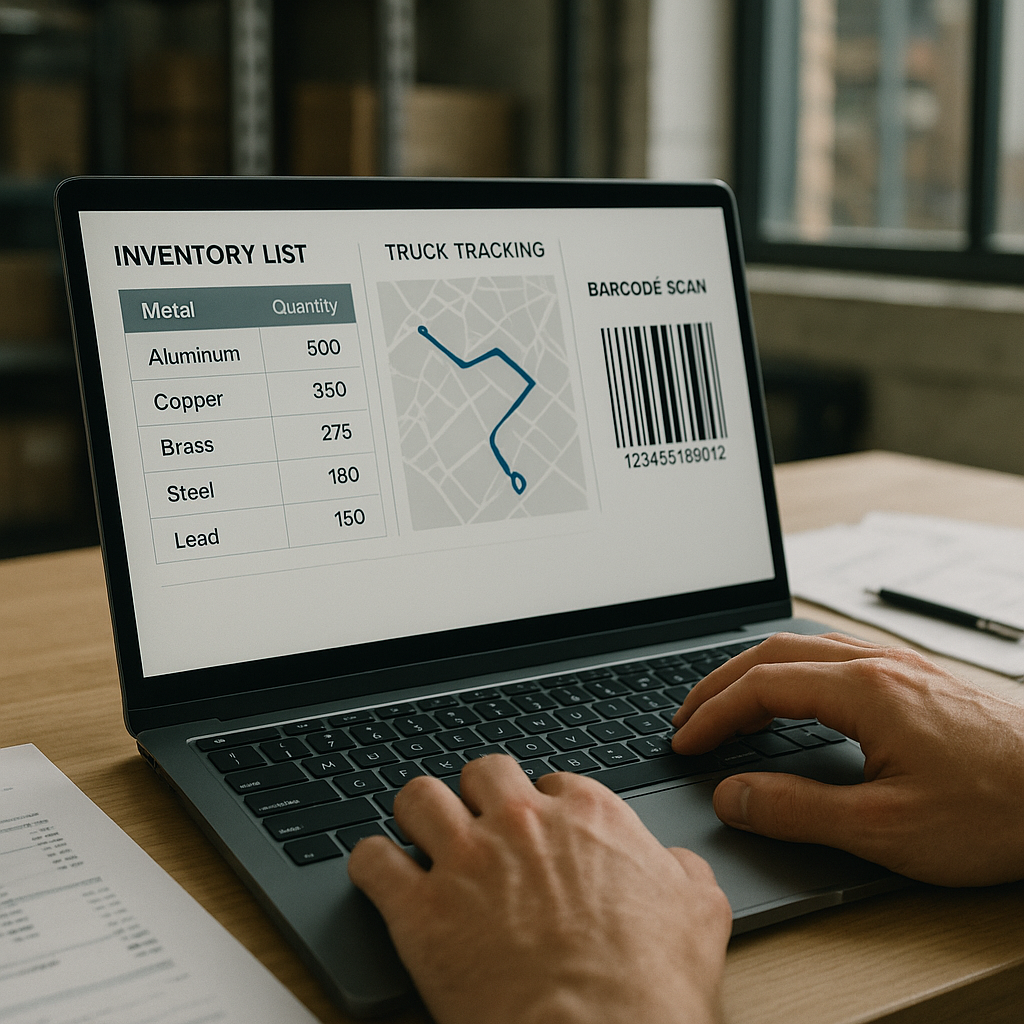5901 Botham Jean Blvd, Dallas, TX 75215
Metal Recycling Software: Features, Benefits, and How to Choose the Right Solution
September 27, 2025Metal recycling software is specialized technology designed to automate and streamline operations for scrap metal recycling businesses. This solution addresses the complex challenges recyclers face in a rapidly changing market. The global metal recycling industry, currently valued at over $280 billion, demands sophisticated management tools to stay competitive.
This software primarily offers real-time management of essential business processes. It handles purchasing transactions, tracks inventory across multiple locations, manages sales contracts, ensures regulatory compliance, and generates comprehensive reports. These systems replace outdated paper-based methods that cannot keep up with the complexities of modern metal recycling.
Advanced solutions like the AMCS Platform and Scrap Dragon offer features tailored to the specific needs of metal recyclers. From documenting material grades to processing scale tickets and tracking material lifecycles, these systems provide an operational transparency previously unattainable. Companies using such software report significant improvements in efficiency, productivity, and profitability in an industry where margins are often very slim.
What are the Key Features of Metal Recycling Software?

Metal recycling software has evolved into sophisticated platforms designed to address the recycling industry’s unique challenges. These specialized solutions optimize workflow, ensure compliance, and enhance profitability through several core capabilities.
Scale Ticketing and Transaction Management
The scale ticketing system is fundamental to metal recycling operations. Modern software solutions automate this crucial function, streamlining the entire transaction process.
Advanced systems integrate directly with weighbridges to automatically capture accurate weights, eliminating manual entry errors and significantly speeding up processing for customers at the scale.
These systems also include fraud prevention tools, like IP camera integration to capture images of materials and vehicles. Some platforms incorporate fingerprint scanning and ID verification to create audit-ready documentation for each transaction.
Inventory Management and Tracking
Effective inventory management is vital for maintaining profitability in recycling operations. Metal recycling software provides real-time visibility into inventory levels across multiple locations.
The software tracks inbound and outbound loads while maintaining detailed records of material types, weights, and values. This assists operators in deciding when to sell specific commodities based on market conditions.
Advanced systems also support inventory regrading, pile-to-pile transfers, and finished goods tracking, crucial for facilities processing materials through various stages before final sale.
| Inventory Management | Real-time tracking of inventory levels, inbound and outbound loads, supports inventory regrading, pile-to-pile transfers, and finished goods tracking. |
| Transaction Processing | Automated scale ticketing systems integrated with weighbridges, fraud prevention tools, and audit-ready documentation of transactions. |
| Compliance Management | Tools for license scanning, signature capture, thumbprint collection, and automatic compliance report generation. |
| Dispatch and Logistics | Tools for scheduling pickups, tracking containers, optimizing route planning, and real-time asset tracking. |
Regulatory Compliance Tools
Compliance with state and local regulations is a continual challenge for recyclers. Modern software includes functionality to simplify this critical aspect of the business.
Features such as drivers’ license scanning, signature capture, and thumbprint collection help recyclers meet anti-theft laws. These tools permanently associate identification with purchase tickets and can be quickly accessed during law enforcement inquiries.
Many systems also support the automatic generation of compliance reports and seamless uploading to required regulatory platforms. This automation reduces the administrative burden and ensures full compliance with local requirements.
Dispatch and Logistics Management
For recyclers offering pickup services, dispatch management capabilities are essential. Software solutions include tools for scheduling pickups, tracking containers, and optimizing route planning.
These systems allow dispatchers to efficiently assign drivers, trucks, and trailers. They also provide real-time tracking of assets, improving resource allocation and customer service.
Many platforms include mobile applications that give drivers access to schedules, navigation, and documentation tools while on the road. This connectivity ensures smooth operations, even when teams are spread across multiple locations.
Accounting Integration and Financial Management
Metal recycling software typically features robust accounting tools or integration with popular accounting platforms. This connectivity eliminates duplicate data entry and ensures financial records remain accurate and up-to-date.
The software generates invoices, processes payments, and tracks accounts receivable and payable. Some systems support split payment options and ATM integration for flexible customer transactions.
Through these integrations, recyclers can quickly access financial reports, track profitability by material type, and make data-driven business decisions—crucial for navigating volatile commodity markets.
Reporting and Business Intelligence
Comprehensive reporting tools offer recycling businesses critical insights into their operations. Modern software provides customizable dashboards and automated reporting functions.
These systems generate detailed analytics on transaction volumes, material flows, pricing trends, and customer activities, helping operators identify their most profitable materials and customers.
Advanced platforms even include commodity price tracking and market trend analysis. These tools help recyclers time their sales to maximize returns in fluctuating markets, turning data into a strategic advantage.
By integrating these key features into a single platform, metal recycling software delivers significant operational improvements while reducing administrative overhead. For modern recycling operations facing tight margins and regulatory complexity, these systems have become essential business tools.
How Does Metal Recycling Software Improve Operational Efficiency?

Metal recycling software enhances daily operations by automating traditionally time-consuming processes at recycling facilities. By streamlining essential workflows, these systems improve efficiency across all operational areas. Transactions that previously took minutes can now be completed in seconds, allowing recyclers to handle more material with the same workforce.
This automation extends beyond basic ticketing. Modern recycling software enhances inventory tracking, customer relationship management, and regulatory compliance while reducing the risk of costly human errors. This technological shift enables recycling businesses to reassign staff from administrative tasks to more valuable activities.
Real-Time Data Visibility Enhances Decision-Making
Access to real-time data is a key advantage of metal recycling software. Yard managers can instantly view inventory levels, monitor processing status, and track material movement throughout the facility. This visibility eliminates guesswork and supports data-driven decision-making.
For example, a medium-sized scrap yard in Texas implemented specialized recycling software, gaining the ability to monitor daily throughput in real-time. This enabled them to immediately identify processing bottlenecks rather than discovering problems later through reports. Based on this data, the company adjusted staffing patterns and increased daily processing capacity by 22%.
Streamlined Scale Operations Increase Throughput
The scale house is often a major bottleneck in metal recycling operations. Software solutions address this by speeding up weigh-ins, automating pricing calculations, and eliminating paper tickets. These improvements generate cascading efficiency gains throughout the facility.
A recycling operation in Pennsylvania reported reducing average scale transaction times from 4 minutes to just 90 seconds after implementing specialized software with integrated scale connections. This improvement allowed them to process 30% more vehicles daily without extending hours or hiring additional staff.
Financial and Compliance Benefits
In addition to operational enhancements, metal recycling software offers considerable back-office efficiency gains. Automated reporting reduces the time spent preparing regulatory documentation and financial statements. These systems also ensure pricing accuracy and proper material classification.
The integration capabilities of modern recycling software further boost efficiency by eliminating duplicate data entry. Information flows seamlessly between scales, inventory systems, and accounting platforms. This integration reduces administrative costs while improving data consistency.
A large multi-location recycler estimated saving over 120 labor hours weekly after implementing integrated recycling software across their operations. Automated data transfer between their yards and corporate office eliminated manual report compilation and enabled real-time financial visibility.
No table output available
Enhanced Customer Service Through Efficiency
The operational efficiencies gained through recycling software directly lead to improved customer experiences. Faster scale transactions result in shorter wait times for suppliers. Accurate pricing and immediate payment processing build trust with regular customers. Digital records simplify dispute resolution and past transaction verification.
Many recycling facilities report that increased operational efficiency has enabled them to extend business hours or add new services without increasing staffing costs. The ability to handle more volume with the same resources creates competitive advantages in local markets.
The efficiency improvements from metal recycling software create a positive cycle. Better data leads to smarter decisions. Faster transactions increase capacity. Reduced errors enhance profitability. These combined benefits explain why technology adoption continues to grow in the recycling industry.
What Should Businesses Consider When Choosing Metal Recycling Software?

Selecting the right metal recycling software is crucial for daily operations, compliance capabilities, and long-term business growth. With various options available, businesses must evaluate key factors to ensure the chosen solution aligns with their specific requirements.
Scalability for Future Growth
Your business will grow, and so should your software. Look for a solution that can handle increasing transaction volumes and expand capabilities as your operations grow. Scalable software prevents the need for disruptive system changes later.
The best recycling software supports growth in users, locations, and transaction volumes without significant performance degradation. Verify whether additional licensing costs apply as you scale and whether the system architecture supports your growth trajectory.
Many recycling businesses start with basic needs and soon require advanced features. Software with tiered functionality allows you to activate capabilities when needed, avoiding overpayment for unused features initially.
User-Friendly Interface and Implementation
Even the most feature-rich software fails if your team can’t or won’t use it effectively. Prioritize solutions with intuitive interfaces requiring minimal training to reduce implementation time and increase staff adoption rates.
Implementation should be well-structured with clear timelines. Ask vendors about their onboarding procedures, data migration assistance, and training resources. A smooth implementation lays the foundation for successful long-term use.
Software with customizable dashboards allows different user roles to access relevant information, improving efficiency and reducing the learning curve for new users.
Integration Capabilities
Metal recycling software rarely operates in isolation. It needs to connect with existing business systems like accounting software and inventory management, and possibly CRM tools.
Evaluate whether the software offers standardized APIs or pre-built integrations with common applications. Seamless data exchange prevents information silos and reduces manual data entry.
For businesses with specialized equipment, verify that the software interfaces with these devices, streamlining operations and improving data accuracy.
Compliance Management Features
The recycling industry faces strict regulatory requirements that vary by location. Your software should help meet these obligations effortlessly.
Opt for software with built-in compliance tools for tracking regulated materials, generating documentation, and storing transaction records as required. The system should adapt to regulatory changes without major overhauls.
The best solutions incorporate compliance updates automatically, ensuring your business remains aligned with current requirements without constant manual monitoring.
Vendor Support and Reputation
The relationship with your software provider extends beyond the initial purchase. Reliable technical support, regular updates, and responsive service are crucial for long-term success.
Research the vendor’s reputation. How long have they served the recycling industry? Do they understand the unique challenges metal recyclers face? Industry-specific knowledge leads to more effective support and relevant product development.
Verify support availability hours, response time guarantees, and support channels. The best vendors offer multiple ways to get help, including phone, email, and live chat options with knowledgeable representatives.
| Feature | Details |
| Scalability for Future Growth | The software should handle increasing transaction volumes and expand capabilities as operations grow. It should support growth in users, locations, and transaction volumes, and offer tiered functionality for activating more features as needed. |
| User-Friendly Interface and Implementation | Solutions should have intuitive interfaces, minimal training needs, and structured implementations. Customizable dashboards for user roles improve efficiency and reduce the learning curve. |
| Integration Capabilities | Evaluate if the software offers standardized APIs or pre-built integrations with applications like accounting and inventory management systems. Ensure it can connect with specialized equipment and devices. |
| Compliance Management Features | The software should assist with regulatory obligations, including tracking materials, generating documentation, and adapting to changing regulations without major overhauls. Automatic updates for compliance help remain current with regulations. |
| Vendor Support and Reputation | Consider the vendor’s industry reputation, support availability, and response time. Check if they have industry-specific knowledge, as it contributes to more effective support. |
| Data Security and Backup Procedures | Security features like encryption and access controls should be in place. Verify backup procedures and disaster recovery plans, and consider cloud-based solutions for security and accessibility. |
| Total Cost of Ownership | Understand implementation costs, maintenance fees, and potential expenses for customization or additional features. Evaluate pricing models and compare value against cost to fit business needs. |
Data Security and Backup Procedures
Your recycling software will contain sensitive business data and customer information. Security features like encryption, user access controls, and audit trails protect this information from unauthorized access.
Ask about the vendor’s backup procedures and disaster recovery plans. How frequently is data backed up? How quickly can systems be restored after an outage? These considerations are vital for business continuity.
Cloud-based solutions offer advantages in security and accessibility but verify where your data is stored and who has access, as some regulations require data to be kept within specific geographical boundaries.
Total Cost of Ownership
Look beyond the initial purchase price to understand the full financial commitment. Consider implementation costs, annual maintenance fees, and potential expenses for customization or additional features.
The pricing structure should be transparent with no hidden costs. Some vendors charge by user, others by transaction volume, and some offer unlimited use models. Determine which approach best matches your business operations.
While cost is important, value matters more. A slightly more expensive solution that better fits your needs often provides a better return on investment than a cheaper alternative with limited functionality.
By thoroughly evaluating these factors, businesses can select metal recycling software that not only meets their current requirements but positions them for future success in an increasingly competitive and regulated industry.
Conclusion: Embracing Digital Transformation in Metal Recycling

The metal recycling industry is at a pivotal moment where digital transformation is essential for both survival and growth. Advanced recycling software enhances efficiency, ensures compliance, and drives profitability beyond traditional methods. Adopting these technologies allows recycling businesses to eliminate inefficiencies, make data-driven decisions, and maintain a competitive edge in a complex market.
Technologies such as smart sensors, automated inventory management, and integrated platforms are transforming how recyclers track materials, optimize routes, and connect with stakeholders. These advancements also have environmental benefits, reducing carbon emissions and resource usage. With rising demand for recycled metals and stricter regulations, companies investing in digital transformation are well-positioned to excel.
For metal recycling businesses aiming to secure their future, evaluating and implementing technology solutions that meet operational needs is crucial. Contact Okon Recycling at 214-717-4083 for expert advice on selecting the right digital tools for your operation.
